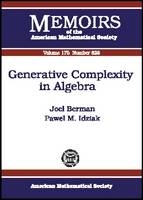
Generative Complexity in Algebra
Seiten
2005
American Mathematical Society (Verlag)
978-0-8218-3707-8 (ISBN)
American Mathematical Society (Verlag)
978-0-8218-3707-8 (ISBN)
- Titel ist leider vergriffen;
keine Neuauflage - Artikel merken
Considers the behavior of $/mathrm{G}_/mathcal{C}(k)$ when $/mathcal{C}$ is a locally finite equational class (variety) of algebras and $k$ is finite. This title looks at ways that algebraic properties of $/mathcal{C}$ lead to upper or lower bounds on generative complexity.
The G-spectrum or generative complexity of a class $/mathcal{C}$ of algebraic structures is the function $/mathrm{G}_/mathcal{C}(k)$ that counts the number of non-isomorphic models in $/mathcal{C}$ that are generated by at most $k$ elements. We consider the behavior of $/mathrm{G}_/mathcal{C}(k)$ when $/mathcal{C}$ is a locally finite equational class (variety) of algebras and $k$ is finite. We are interested in ways that algebraic properties of $/mathcal{C}$ lead to upper or lower bounds on generative complexity.Some of our results give sharp upper and lower bounds so as to place a particular variety or class of varieties at a precise level in an exponential hierarchy. We say $/mathcal{C}$ has many models if there exists $c>0$ such that $/mathrm{G}_/mathcal{C}(k) /ge 2^{2^{ck}}$ for all but finitely many $k$, $/mathcal{C}$ has few models if there is a polynomial $p(k)$ with $/mathrm{G}_/mathcal{C}(k) /le 2^{p(k)}$, and $/mathcal{C}$ has very few models if $/mathrm{G}_/mathcal{C}(k)$ is bounded above by a polynomial in $k$.Much of our work is motivated by a desire to know which locally finite varieties have few or very few models, and to discover conditions that force a variety to have many models. We present characterization theorems for a very broad class of varieties including most known and well-studied types of algebras, such as groups, rings, modules, lattices. Two main results of our work are: a full characterization of locally finite varieties omitting the tame congruence theory type 1 with very few models as the affine varieties over a ring of finite representation type, and a full characterization of finitely generated varieties omitting type 1 with few models. In particular, we show that a finitely generated variety of groups has few models if and only if it is nilpotent and has very few models if and only if it is Abelian.
The G-spectrum or generative complexity of a class $/mathcal{C}$ of algebraic structures is the function $/mathrm{G}_/mathcal{C}(k)$ that counts the number of non-isomorphic models in $/mathcal{C}$ that are generated by at most $k$ elements. We consider the behavior of $/mathrm{G}_/mathcal{C}(k)$ when $/mathcal{C}$ is a locally finite equational class (variety) of algebras and $k$ is finite. We are interested in ways that algebraic properties of $/mathcal{C}$ lead to upper or lower bounds on generative complexity.Some of our results give sharp upper and lower bounds so as to place a particular variety or class of varieties at a precise level in an exponential hierarchy. We say $/mathcal{C}$ has many models if there exists $c>0$ such that $/mathrm{G}_/mathcal{C}(k) /ge 2^{2^{ck}}$ for all but finitely many $k$, $/mathcal{C}$ has few models if there is a polynomial $p(k)$ with $/mathrm{G}_/mathcal{C}(k) /le 2^{p(k)}$, and $/mathcal{C}$ has very few models if $/mathrm{G}_/mathcal{C}(k)$ is bounded above by a polynomial in $k$.Much of our work is motivated by a desire to know which locally finite varieties have few or very few models, and to discover conditions that force a variety to have many models. We present characterization theorems for a very broad class of varieties including most known and well-studied types of algebras, such as groups, rings, modules, lattices. Two main results of our work are: a full characterization of locally finite varieties omitting the tame congruence theory type 1 with very few models as the affine varieties over a ring of finite representation type, and a full characterization of finitely generated varieties omitting type 1 with few models. In particular, we show that a finitely generated variety of groups has few models if and only if it is nilpotent and has very few models if and only if it is Abelian.
Introduction Background material Part 1. Introducing Generative Complexity: Definitions and examples Semilattices and lattices Varieties with a large number of models Upper bounds Categorical invariants Part 2. Varieties with Few Models: Types 4 or 5 need not apply Semisimple may apply Permutable may also apply Forcing modular behavior Restricting solvable behavior Varieties with very few models Restricting nilpotent behavior Decomposing finite algebras Restricting affine behavior A characterization theorem Part 3. Conclusions: Application to groups and rings Open problems Tables Bibliography.
| Erscheint lt. Verlag | 1.8.2005 |
|---|---|
| Reihe/Serie | Memoirs of the American Mathematical Society |
| Verlagsort | Providence |
| Sprache | englisch |
| Themenwelt | Mathematik / Informatik ► Mathematik ► Analysis |
| ISBN-10 | 0-8218-3707-9 / 0821837079 |
| ISBN-13 | 978-0-8218-3707-8 / 9780821837078 |
| Zustand | Neuware |
| Haben Sie eine Frage zum Produkt? |
Mehr entdecken
aus dem Bereich
aus dem Bereich
Grundlagen, Beispiele, Aufgaben, Lösungen
Buch | Hardcover (2022)
Hanser, Carl (Verlag)
CHF 41,95


